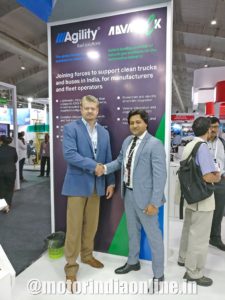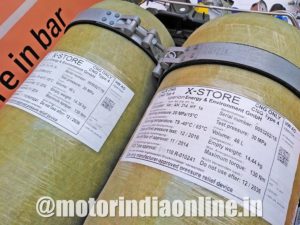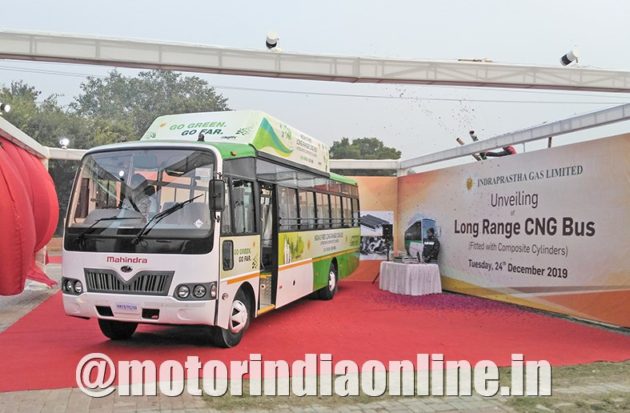Aspiring to make a shift away from diesel towards gas fuels for long-distance transportation, a tripartite alliance is ready with a host of tailor-made natural gas solutions for cars and commercial vehicles to start with. They consider converting the existing short-range buses to meet long-range requirements with their CNG systems as an immediate priority to kick-start the transition with a concurrent retro-fitment and OEM approach. Other segments including long-haul trucking and premium passenger cars are to follow suit, reports Dhiyanesh Ravichandran

The global automotive industry is finally on road with natural gas. It has become a clean and economic alternative to the woes of conventional fuels and the shortcomings of pure electric mobility. Although natural gas is not new for the automotive industry, it is only in recent times that this space is receiving fresh attention and much-awaited innovation from the leading industry players. The Indian market is no exception, despite having come a long way ahead in adopting natural gas as one of the staple fuels for vehicles in our country. At the forefront of this emerging progression in natural gas solutions is Agility-Advantek, a strategic alliance to provide compressed natural gas (CNG) products and services to the Indian commercial vehicle market.
Early this year, the partnering companies came up with the country’s first long-range CNG bus under a programme led by Indraprastha Gas Limited (IGL) with a driving range of more than 1,100 km, thanks to its light-weight Type IV composite gas cylinders and sophisticated fuel systems technology. “One of the core objectives of this partnership that emerged in 2018 was to offer a complete 360-degree green fuel technology and experience to customers in India. We are aces in our respective areas, but an integration of ideas and synergies is what we looked at to offer innovative and effective solutions in an emerging and disruptive space,” says Ravindra Vasisht, Regional Director, Agility India.
While the US-based Agility Fuel Solutions is a global supplier of clean fuel solutions for commercial vehicle fleets and OEMs for more than two decades, Advantek Fuel Systems is known for the development and integration of a wide variety of alternative fuel systems for transportation and industrial applications for over 15 years in India, along with its robust service network across the country. Yet another uniqueness of this partnership is the value addition from Hexagon Composites, a Norway-headquartered global supplier of lightweight transport modules for gases, and the parent company of Agility Fuel Solutions.

While Agility Fuel Solutions manufactures Type IV composite cylinders and systems used for medium and heavy-duty commercial vehicles, the Type IV cylinders for light-duty CNG systems of Agility-Advantek are sourced from Hexagon Purus, a subsidiary of Hexagon Composites. Together as a group, they constantly carry out innovation in tanks to make them lighter and efficient. These are about 70% lighter than conventional steel tanks that are common in the market right now, which enables the customers to add bigger or more cylinders to extend the fuel storage capacity in their vehicles. “As of now, we have begun with the complete assembly of our CNG solutions in India except for the composite cylinders. Once the market gains enough traction, we will localise tank manufacturing as well,” Vasisht reveals.
CNG: The ‘Low-Hanging Fruit’
“We are 100% fuel agnostic in our approach; all clean energy fuels and renewables are in the domain of our interest,” claims Vishal Singhal, Managing Director, Advantek Fuel Systems. Agility Fuel Solutions and Advantek Fuel Systems have the expertise and technologies ready to adapt any gas fuels for automotive use cases, including LNG, LPG, and hydrogen. However, he adds, customers’ interests are tied to a simple question: which fuel solves their problems and saves costs? He explains that diesel being the conventional fuel for long is challenged techno-commercially on emission regulations, while CNG that emerged as a cleaner alternative is facing a different set of issues including limited fuelling infrastructure outside the city and long queues at the existing stations.

This hinders fleet operators to extend CNG for long-distance and heavy commercial operations, and for those who operate within the city limits, the saving multiples remain marginal as the existing solutions offer limited fuel storage. “Despite CNG being a cheaper and cleaner fuel than diesel, the market adoption remains stagnant in India and is out of reach for a host of segments and applications,” he opines. Singhal feels that the long-range CNG solutions put forth by both the companies are a boon against this backdrop as it addresses the twin problem that CNG users are facing today.
“With our Type 4 composite cylinders, users can store more fuel. Commercial operators can adopt CNG for long hauls, which means they can reap cost savings in a big way,” he says, while adding that increased penetration of natural gas in long-distance applications will go a long way in combating particulate emissions from diesel. In this respect, three broad options of CNG solutions are approved in India – petrol-CNG (flexi system), diesel engine converted to run on CNG (mono) and diesel-CNG (flexi). Depending on the vehicle segment and operational requirements of the customer, Advantek Fuel Systems can offer custom-made solutions in all these three categories.
At present, CNG is the real low-hanging fruit in the domestic market, observes Vasisht. To his team, this is the right space to kick-start the shift away from diesel to cleaner gas fuel in the automotive industry in India, which can later open up new avenues for other gas fuels like bio-CNG, LNG, CNG-electric hybrids, hydrogen, and so on. Asked about his company’s business approach to CNG solutions in terms of entry points (into mainstreaming) and target customers, he explains that Agility-Advantek is trying to create traction at all levels. “It is not either OEM-side approach or aftermarket retro-fitment. Both these spaces have their own potentials and limitations and have an equal presence in the market.”
“We have decided to create traction at all levels by identifying demand on case-to-case basis. For instance, in the PV and taxi segments, our entry points can be individual customers and retro-fitters, while for heavy and commercial vehicles, OEMs may show positive interest. There can be exceptions like a truck fleet operator wanting to adopt CNG en masse or a car OEM trying to encash the value-proposition we offer in our solutions. It all depends on the merit of each case,” he adds.

Customised Solutions
The immediate interest area for the company is to prep the existing short-range buses to long-range applications using Type IV composite cylinders. The system design and integration were successfully demonstrated under a strategic programme with Indraprastha Gas Limited (IGL) early this year, wherein the Agility-Advantek CNG system could extend the range of buses to about 1,100 km from 350 km. In other words, Agility Fuel Solution’s four tanks in the buses nearly doubled the 720-litre capacity of existing market options to 1,360 litres in total. “Since OEM-made solutions may take some time, we are actively engaging fleet owners and aftermarket fitment players to convert their existing diesel or low-range CNG vehicles to long-range with our systems,” Singhal informs.
“We are also partnering with gas-supplying companies to support our efforts in bringing CNG into the mainstream fuel grid,” he adds. Besides, Advantek Fuel Systems is considering putting up a facility dedicated to the conversion of engines and integrate them with its CNG kits perfectly and professionally with global technical and systems guidance from Agility Fuel Solutions. “So far CNG conversion happens in independent garages and roadside workshops where the mechanics resort to crude and conventional methods with no proper know-how. However, as a full-system supplier, packaging and serviceability are important to us,” Singhal observes.
“Our systems need informed handling and proper integration with the engine for desired results,” he adds. Moreover, the company is not restricting its role to systems only, but may also design components and offer customised solutions to suit the specific needs of its customers. “For instance, composite cylinders are an integral part of our package. If in case a customer prefers to go for a different cylinder that suits his requirement the most, we shall very well source the same from market vendors and integrate the same with our system,” Vasisht states.
Alfred Walberer, Vice President (CNG Light-Duty Vehicles) of Hexagon Purus finds India an interesting market for CNG despite the transition being at a nascent stage as compared to Europe. “With India implementing Euro 6 equivalent emission norms, automakers and buyers are slowly moving away from diesel in the PV segment. With fuel and running costs going up further, the TCO works in favour of gas vehicles, not just for the CVs but also for private car owners. We are offering a clear value-proposition over the long term. For instance, PVs can save boot space at lower weight,” he points out.
Singhal also agrees that the BS VI era would turn out to be a boon for CNG adoption in India as increasing vehicle and operating costs would push customers into CNG for higher cost-saving. Given this emerging scenario, Hexagon Purus has substantially increased its production capacity of composite CNG tanks to meet the growing demand in recent times. It has tripled its annual production volume for its largest customer Volkswagen AG in the last one year. With a mindset change happening with Indian buyers on CNG, Walberer predicts an adoption rate of 20% volume for Type 4 composite tanks in the next five years.

Potentials Areas of Growth
Asked about the near-future portfolios for Agility-Advantek in India, the team identifies three important potential areas. First, with long-range CNG bus solutions getting popular, they foresee a similar adoption in the long-haul trucking segment as well. They have started engaging transport fleets and truck makers, and are confident that a whole new segment of CNG trucks would ensure first-mover advantage for the company. Second, premium car segments are left out for CNG at present, owing to practical compromises on boot space, engine and suspension performances, range anxiety, and above all, the packaging. With Type 4 gas tanks Agility-Advantek can eliminate these practical constraints at a relatively lower cost for premium cars, which can open up new business segments for the company in India.
Thirdly, Advantek Fuel Systems has already worked on India’s first fleets of LNG trucks and buses that are successfully running, giving the partnership a comfortable head-start in LNG fuel as well. Agility-Advantek strongly believes that positioning LNG and CNG in a rigid manner as long-range or short-range solution is self-defeating. “Each fuel has a value proposition based on the dynamic requirements of the fleet operator within his given constraints. A fleet making a casual decision on the fuel (CNG or LNG) is more likely to face disadvantages over the long term,” Vasisht says.
Instead, he insists that fleets should list their requirements on range and examine the types of vehicles they own, the routes they operate, and the availability of refuelling infrastructure along those routes to arrive at an informed view on which sets of fleets and routes should run on LNG and which on CNG. “Agility Fuel Solutions can help them make these critical decisions since we are agnostic to both the fuels. We design and offer a ‘filling to firing’ suite of solutions and work like an automotive OEM in understanding the market and customer expectations to bring about a paradigm change in the clean fuel automotive market in India,” he elaborates.